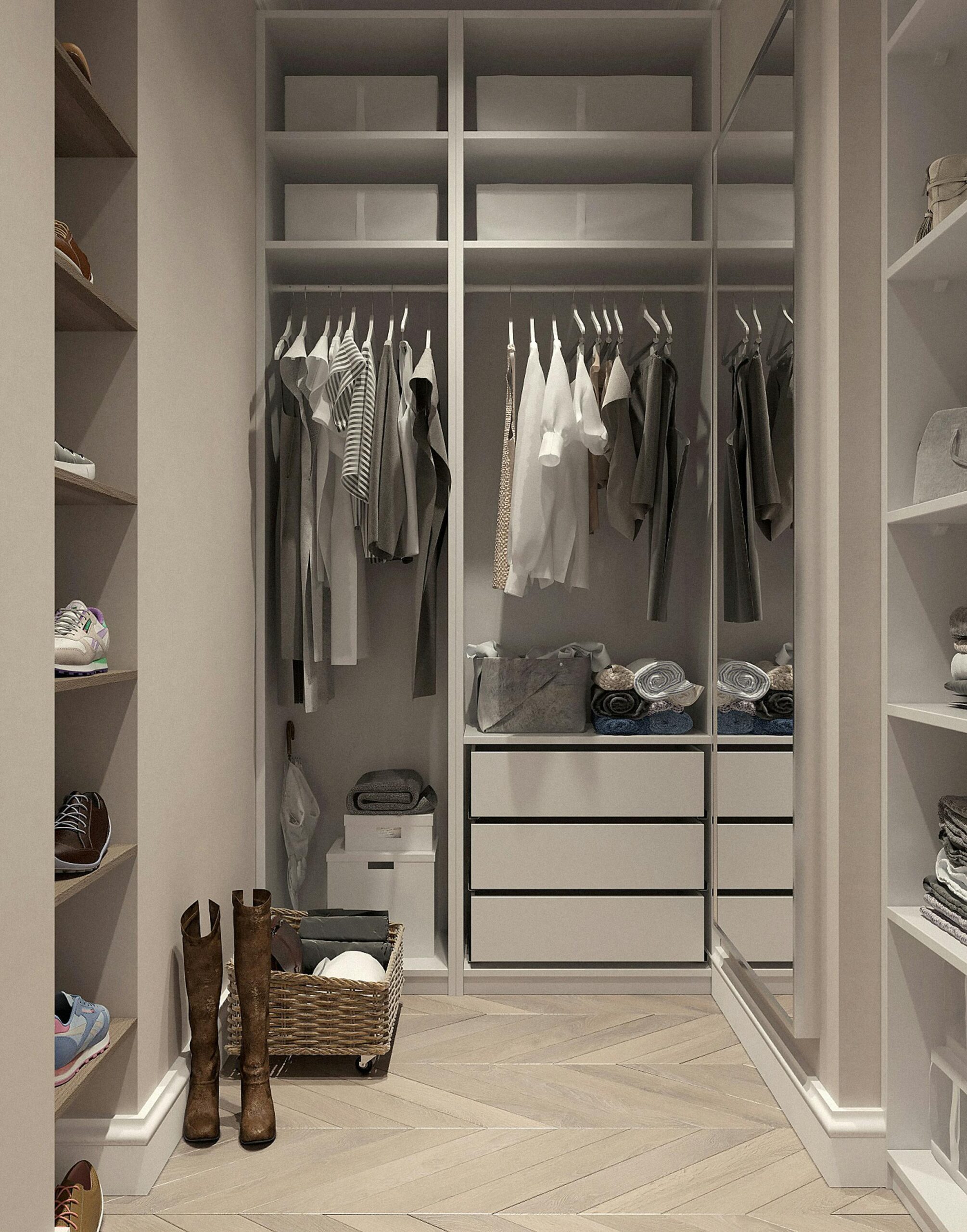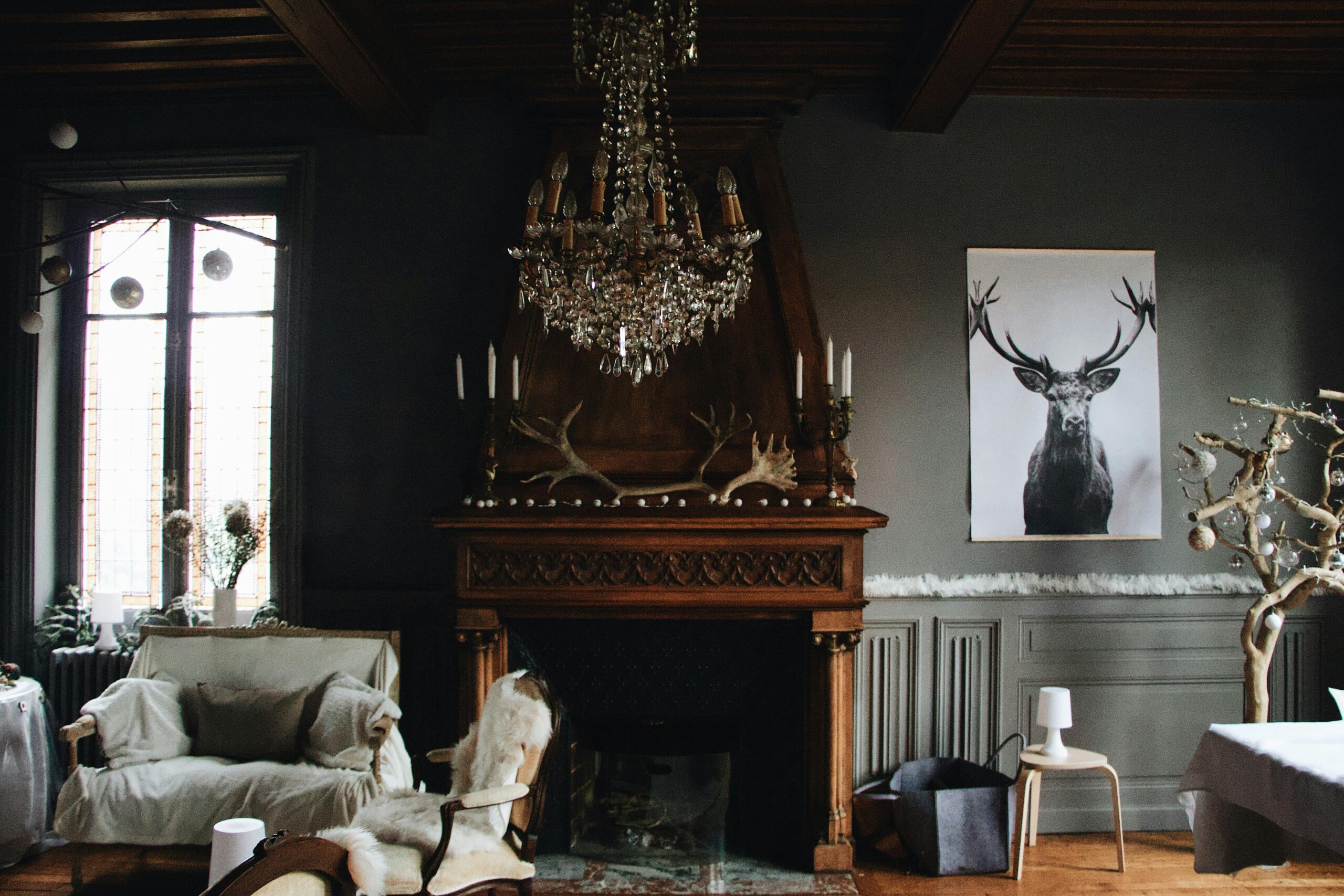Got a dirty closet? Let’s clean it up! According to Fen Shui, closets are more than clothing cupboards, they also represent hidden emotional energy and mental clutter. A disorganized closet creates stress and stagnant energy. A properly organized closet evokes calm, clarity, and harmonic energy. A clutter-free, well-arranged closet not only saves time and reduces stress, but it can also lower cortisol levels, fostering a more peaceful and productive environment (Pérez & Yetikyel, 2024). Ready to clear the clutter and find some balance? Here are The Modern Home’s essential tips.
Clear the Closet Clutter
The first step to any organizational project is to clear the clutter. Empty your closet completely and sort your clothes into three piles: keep, donate, and discard (Kessman, 2024). A helpful rule for deciding whether to keep an item is the “Five Outfit Rule.” If you can create at least five different outfits with it, then it stays (Priestly, 2024). Additionally, consider letting go of items you haven’t worn in the last 90 days (Priestly, 2024). This will clear up space and help you focus on the pieces that truly serve you.
Categorizing by Type and Color
After decluttering, categorize your clothes by type – example shirts with shirts, boots with boots, and button-ups with button-ups. This will make dressing a snap. Another technique that can simplify your closet organization is grouping items by color. Not only does this create a visually calming effect, but it also allows you to quickly spot and assemble outfits (Cummings, 2024).
Creating Functional Zones in Your Closet
To further improve organization, create functional zones within your closet. Group items based on their usage frequency. For example, place items you wear frequently at eye level for easy access, while less-used items, like formal wear, can go higher up or toward the back (Priestly, 2024). Items you often wear together should be stored near each other to save time in the morning (Cummings, 2024).
Hanging vs. Folding Clothes
Different clothes require different storage. Hang items that wrinkle easily, such as dresses, blouses, and blazers to preserve their shape (Finn, 2024). Folding sweaters prevents stretching or damage to the fabric (Finn, 2024). For smaller items like winter accessories, swimsuits, or shoes, bins can be a great storage solution (Finn, 2024).
Know How to Fold Them
Consider rolling your clothes rather than stacking them. Rolling helps to minimize crumpling, and organizing clothes in files rather than piles will provide better visibility and access to each item (Finn, 2024).
Bins and Drawer Dividers Maximize Storage
Reduce visual clutter and maximize your space using bins and drawer dividers. For a cohesive look use matching bins and dividers in drawers to keep smaller items separated and easy to find (Cummings, 2024). Stackable bins are particularly useful for maximizing vertical space, which is often underutilized in smaller closets (Cummings, 2024).
Maximizing Vertical Space
Utilize vertical space in small closets to significantly increase your storage capacity. Add extra shelves or hanging rods for storing shoes, bags, or folded clothes. Over-door organizers are a great way to create additional storage without taking up extra floor space (Priestly, 2024).
Double the Storage with Adjustable Bars
To further optimize your closet, consider installing adjustable closet bars. The lower half of your closet can be transformed into a second hanging level for items like pants, skirts, or tops. This simple solution effectively doubles your storage capacity without requiring more space (Ashley, 2024).
Storing Seasonal Items
Live in an area with seasonal weather? Versatile weather clothes can take up a lot of space in your closet. To reduce clutter, store out-of-season clothing in under-bed bins or vacuum-seal bags (Finn, 2024). Consider rotating your clothing to match the seasons, storing the extra in a separate location.
Organizing Accessories
Jewelry and accessories often pose a unique storage challenge. Velvet or clear trays protect jewelry while keeping it visible and accessible. Hats, scarves, and bags store easily on hooks or rods, while shoes are best kept in stackable bins or hanging racks (Finn, 2024). Purses and handbags can be stored in acrylic organizers to preserve their shape (Finn, 2024).
Maintaining Closet Organization
A well-organized closet requires ongoing maintenance. Regularly evaluate your closet for tidiness and functionality. Create a designated place for each item, and purge any items you no longer wear or need. Making this a regular habit will keep your closet neat and prevent unnecessary clutter. (Priestly, 2024).
Conclusion
Following these tips will turn your closet into a well-organized space that saves you time, reduces stress, and enhances your daily routine. From custom shelving to clever storage solutions, or minimalist principles, a thoughtfully organized closet will help you feel peaceful confidence.
Sources:
- Pérez, C., & Yetikyel, G. (2024). How to Organize a Closet For Maximum Peace of Mind. Vogue.
- Kessman, M. (2024). Insights on closet organization.
- Priestly, T. (2024). Tips from Ready, Set, Refresh! Home decluttering.
- Cummings, C. (2024). Advice from The Stylish Organizer.
- Finn, A. (2024). Tips from Reclaim Professional Organizing.
- Ashley, L. (2024). Insights from interior designer Lauren Ashley.
Jenica “Hen” Weyand is a seasoned writer and creative professional with over 20 years of experience in brand storytelling, art, fashion, trends, and lifestyle. With a background in theater, design, and brand experience, Jenica continues to shape conversations around art, style, and modern living.
Jenica Weyand





